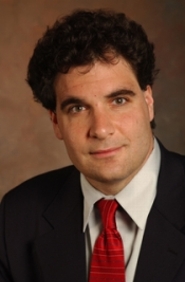
When introducing Joseph Fornieri, professor of political science at the Rochester Institute of Technology, Hamilton College Professor of History Doug Ambrose pointed out that recently we have witnessed a deluge of books about Abraham Lincoln. Why then, asked Ambrose, do we need another book on Lincoln? As Fornieri’s lecture clearly showed, we still stand to learn a great deal from a true statesman like Lincoln.
During the lecture, presented by the AHI Undergraduate Fellows, Fornieri gave a brief lecture outlining his new book, Abraham Lincoln, Philosopher Statesman, followed by a panel discussion with Frank Williams, former chief justice of the Rhode Island Supreme Court and founding chairman of the Lincoln Forum, and Dr. David Frisk, resident fellow of the Alexander Hamilton Institute.
Fornieri’s lecture delineated how Lincoln truly embodied a great statesman by examining six key dimensions of the 16th president: his theoretical wisdom, practical wisdom, and commitment to duty, magnanimity, rhetoric and patriotism. As Fornieri described it, “Lincoln embodied what political philosophers described in theory” by balancing the theoretical with the practical, the philosophy with the politics, “a greatness of thought, and of action.” Yet, he pointed out, it is not enough to simply look at the accomplishments of politicians when evaluating them as a statesman, but goodness must be considered as well. That, said Fornieri, “is the difference between Napoleon and Lincoln.”
At the basis of Lincoln’s reasoning was a deep commitment to theoretical wisdom. When approaching issues like emancipation, he searched for the root or source of the problem. He stated that as a country, the United States could not consider every man equal if slavery was practiced. However, a strong theoretical knowledge is not enough because real life circumstance will always challenge theory and ideas. That is why Lincoln’s prudence was a crucial component of his statesmanship. He had the rare ability to apply his theoretical wisdom to real situations, while understanding the limits of what is possible in practice.
Similarly, Lincoln was both empowered and constrained by his commitment to upholding his duty as president. He understood his specific charge at the time and honored his oath to represent the whole country, not just part of it. This is what drove him to “preserve, protect, and defend the constitution” without letting his personal desires cause him to overstep his boundaries.
Perhaps an understated characteristic of Lincoln was his magnanimity, or as Fornieri called it, “his goodness of soul.” To articulate this point, Fornieri quoted W.T. Sherman, who said, “Lincoln…possess[es] more of the elements of greatness combined with goodness than any other.” Fornieri described the delicate balance of recognizing his own greatness and how this could be harnessed to create large scale good, while also knowing and accepting his own limits. This is how Lincoln safeguarded himself “from hubris, or being blinded by power, as so many are.”
Lincoln’s rhetoric, or ability to persuade, not only distinguished him as a great statesman, but also separated him from many of the politicians of today. Fornieri made an important distinction between Lincoln’s rhetoric and the rhetoric of today, which is more akin to demagoguery and sophistry. Instead of appealing to the base passions of a crowd, or cleverly manipulating the truth behind the guise of authority, Lincoln explained his complex thoughts in a simple straightforward manner, without distorting the truth.
Finally, Lincoln was a true patriot. Patriot, Fornieri, is a term we seem to be “allergic” to lately. Today, patriotism is confused with jingoism, nationalism or chauvinism, claimed Fornieri. But for Lincoln, his patriotism was simply a love for his country. He wanted its advancement more than anything, not only for its own prosperity, but to act as exemplar to the rest of the world that a free nation could accomplish great things. As panelist Williams asked the crowd, “When was the last time any of us heard the word patriot or patriotism in our lifetime…and not in mockery, or during a Sunday football game…but to describe some who genuinely loved his country. That’s what Lincoln did.”
As he concluded, Fornieri noted that “Lincoln gives us a greater appreciation for the statesman, and vice versa.” In response to the question posed by Ambrose at the beginning of the lecture, Fornieri implored, “As you vote tomorrow, I hope you will take these characteristics into consideration,” demonstrating the importance of studying Lincoln and striving to live up to the legacy he left as a great statesman.
Posted November 4, 2014
